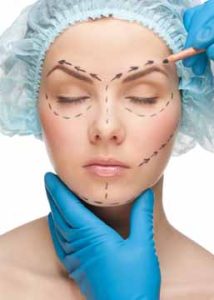Rhinoplasty Revision Surgery (Nose Job Revision) Atlanta
Dr. Paul McCluskey is an experienced plastic surgeon in Atlanta, GA providing state of the art surgical treatments, including rhinoplasty as well as revision rhinoplasty. Revision rhinoplasty surgery may be required if the patient is unhappy with the primary nose job performed by a cosmetic surgeon. The corrective surgery may be necessary to remove the imperfections or abnormalities caused by the original procedure.
If the primary rhinoplasty procedure compromised the basic integrity or ethnicity of the face, caused a loss of facial harmony, or caused functional difficulties of the nose, the plastic surgeon may recommend a revision procedure. Patients in Atlanta, GA or surrounding areas who may be dissatisfied with the outcome of their nose job may consult Dr. McCluskey for a corrective procedure.
Preparation
The cosmetic surgeon will evaluate the aesthetic and functional problems of the nose that may have arisen from the previous nose surgery. The problems could relate to the shape of the nasal bridge, size or shape of the nasal tip, or breathing problems caused after a primary nose job. In some cases, the problem may have occurred during the recovery period, and may not be directly connected to the first surgery. The surgeon will try to determine the precise causes of the problem in order to develop an effective treatment plan for a revision surgery.
Surgical Goals
Patients should be made aware that a revision rhinoplasty procedure will usually be more complicated than the original surgery. The goal of the surgeon is to correct the problems caused in the first surgery, and to restore the aesthetic appearance of the nose as per the patient’s needs.
In many cases, the surgeon may have to perform a re-construction of the nose and re-draping of the skin during a revision rhinoplasty. Sometimes the surgeon may be faced with limiting factors such as skin elasticity and natural thickness and texture of the skin. The extent of scar tissue resulting from the primary procedure may also be a limiting factor.
Reconstructing the Nose
The plastic surgeon may recommend a reconstruction of the nose as an approach to revision rhinoplasty in several cases. It may become necessary to reconstruct the underlying nasal structure to correct functional problems as well as restore the aesthetic appearance of the nose. The procedure may involve nose grafting with the utilization of cartilage from the nose, ear, or ribs of the patient.
In some cases, the surgeon may use the Fascia from the scalp to obscure imperfections on the nasal tip or nasal bridge. Artificial nose implants may be required if the availability of the patient’s natural tissue is limited or due to aesthetic concerns. If the revision procedure involves an ethnic patient, the surgeon should be careful to maintain the basic ethnicity of facial features while performing the surgery.
Recovery
The patient may experience mild pain and discomfort for the first few days following the surgery. Most patients can resume their regular activities and go back to work within a week to 10 days. Full recovery may take several weeks or months, depending on the extent of surgery and whether implants or other procedures were involved. Complete effects of the procedure will be visible as the swelling and bruising resolves entirely over several weeks.







